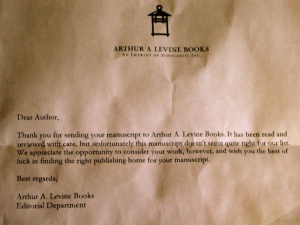If you’re a serious writer who’s either published or working to get published, you’re not new to the dreaded rejection letter. They’re as ubiquitous to publishing as milk to the coffee industry. What happens when you get one of these in the mail?
Do they cause depression?
Rebellion?
Anger?
For some highly enlightened souls, rejection letters cause them to revise their manuscript and even create a new story twist or plotline that they hadn’t thought of before.
Some truths about literary rejection letters:
- They are a sign of courage that you were willing to write something worthy of market value, polish and perfect it to industry standards, and put it before someone else’s eyes to be judged. Don’t discount this aspect, it means something.
- They are unbelievably common among all of our industry peers – from John Grisham and Dan Brown to J.K. Rowling. Depending on what you write and which market niche you’re approaching, the odds of getting a query or manuscript accepted by either a publisher or agent are unmistakably low.
- It’s not personal. Unlike relationship rejection, literary rejections are solely based on your manuscript and project, not you as a person. When you can think of it in those terms, doesn’t it become a bit more business-like, impersonal, even clinical?
- They don’t mean you’ll never get published – just that it hasn’t happened YET.
Picture yourself at a job interview. You’re highly skilled in your field, have some polished work samples and business references with you, but you somehow don’t make it to that second interview. Why? There could be a thousand reasons, and mostly they’re all because you and your skills just simply aren’t the right match for the position. This mismatch concept holds true in the literary industry as well. You’re sending your unique manuscript to a complete stranger and hoping your project and vision will track with what the agent or publisher is seeking for their client list.
Let’s step back a moment and take a look at this literary agent. And let’s assume you’ve done your research and confirmed that this particular agent is interested in acquiring manuscripts within your genre and they’re considering taking on new clients. And let’s say you’ve worked with an industry mentor to perfect your query letter, you have your manuscript formatted perfectly, and have gone through three editing rounds to fix any grammatical errors. The thing is, even if all these bases are covered, there are still lots of other variables that can influence whether an agent selects your manuscript over someone else’s. Like what?
- Gender – Not you, your protagonist. The agent might be looking for fiction with a strong female protagonist and yours is male.
- Voice – They could be looking for third person POV and yours is first person.
- Length – Your manuscript could be too long or short for the existing market of your genre.
- Subject matter – Some agents are seeking stories consumable by a wide audience. So if your book has a super edgy theme and touches controversial topics, they might opt to pass.
- New or published writer – Some agents are eager to hear from fresh industry voices; others only want to work with established and previously published authors.
- Setting – Some want domestic stories, yours might take place in Paris.
And these are just a few! I know, it’s enough to make you go insane. But you’re not expected to mold your manuscript to every single thing a potential agent or publisher could possibly ever want. The platitudes are true – write what you love. The good news is that there are lots of publishers and literary agents available in every genre, more every day, and lots of them are looking for new writers. Where are they? Check here.
Too often, an agent will reject a manuscript because it lacks the specific WOW factor they were looking for. That doesn’t necessarily mean they didn’t like it and that it’s not good. Because the industry landscape has changed so drastically in the past few years, they’re forced to be even more selective with the types of projects they invest in. In other words, if an agent can’t immediately see the potential for revenue in your book, they’re likely to pass even if they otherwise like your story, your writing, and everything about you. Money isn’t all that matters, but it definitely matters.
Emotional Intelligence
Rejection letters are a great reminder that we must constantly keep our thoughts on the right track and stay in a positive and inspired space when it comes to writing. DON’T wallpaper your office with rejection letters! The last things we need as writers are negative reminders. Observe your reaction to your last rejection letter. Did you use it as fuel to grow deeper into your craft and commitment to success? If not, it’s okay, there’s time to work on this. And it IS work and no one’s more worthy of that work, time and energy than you are. For more reading on creative resilience, check out this great article from Lifehacker.
Focus on Inspiration
What inspired you to write your book in the first place? What kinds of books and writing continue to inspire you? This is the fodder for your creative expression and it must be positioned on a pedestal because it’s the most important aspect of your writing relationship. You see beauty around you, kindness, amazing human stories. Whatever it is that drives you to your keyboard or your journal, hold that in your heart as your primary focus. Post pictures of that inspiration in your writing space, your desktop, as reminders of what motivates you and what drives you to succeed over and over despite the odds.
Self-Publishing
The publishing industry has shrunk, or grown, depending on your perspective. And the changes are vast. 31% of all e-book sales are from self-published authors. Why do some writers turn to self-publishing as an option? There are lots of advantages, such as royalties. The royalties are typically way higher than traditional publishers (though no advance), and it’s a super quick turnaround to see your work in print (generally 30 days as opposed to 15 months). As you’re not working with a literary agent to sell your manuscript, there’s no middle man to take a 15% cut off your royalties when they start coming in. But there are offsets, too. Self-publishing can be expensive ($500 – $5000 per book), and there’s a lot more work you’ll need to do to push your book into the commercial marketplace, like arrange for distribution, marketing, advertising, editing, cover art, and layout.
Check out these famous, best-selling books and authors that were initially rejected by (in some cases, many) publishers or agents:
- J.K. Rowling for Harry Potter and the Philosopher’s Stone
- Jack Canfield for Chicken Soup for the Soul
- C.S. Lewis for The Chronicles of Narnia
- Dan Brown for The Da Vinci Code
- J.D. Salinger for The Catcher in the Rye
- Margaret Mitchell for Gone With the Wind
- Alice Walker for The Color Purple
There’s more here
What does this tell you? You’re in good company for one thing. Rejections give us an opportunity to re-examine what we’re doing…any why. If making money is why you write, self-publishing could be a great option for you. If you’re a compulsive storyteller hell bent on finding a traditional publisher or agent, then sink your teeth into that path and persevere and don’t let anyone tell you otherwise.
There are many forms of success – how do you measure yours and what’s your benchmark? If you’re new to the writing path, maybe finishing a novel is a worthy pursuit right now, or you might want to publish 5 books a year, or earn enough to quit your day job. A stack of rejection letters means you’re engaged, working, and investing time and energy in your success and future. Don’t let them derail you; instead use them as a necessary tool of the trade.
What are your rejection war stories, or successes that started as rejection letters? Please share!









Dear Lisa,
If you believe whole-heartedly in what you wrote, almost obsessionally in the fact that you
got it right, then rejection is like water off a duck’s back. Usually it means it just didn’t fit
what the editor was looking for. I almost never readjust (revise) my writings to fit their
needs, they have to come to mine. Which is probably why I’m a house painter, ha ha ha!
The other tactic is to keep several manuscripts in play —- say you have ten ms out there in the
world looking for a publisher and you get one acceptance that means you have a 10% acceptance
rate.
Love & Hugs,
Mark Weber in Albuquerque
I’ve noticed the longer I’m at this the better the rejections become. I analyze each one– almost obsessively, if they’ve personalized it– and try to figure out where my MS falls. A while back Suzie Townsend from New Leaf Literary wrote a post about what form rejections really mean. Her blog is Confessions at suite 200 (something like that. I can look it up for you, if you want.) It’s an interesting read and helps assure you that most times it IS NOT your writing or your book. It’s simply not what they are looking for at that time.
Lisa; I have eight published books out now with two in the works. All have been accepted by legitimate publishers. Amazon Encore picked up my 5th century mysteries and me as an “unrepresented author.”
I never wrote a novel that I didn’t want to write — and being published be d—-d. Good critique groups are a must!